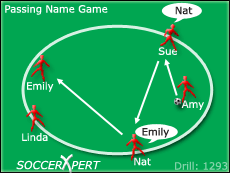I still remember the first soccer game I covered. I was 19 and I had just been recruited by my friend Sunny to cover the women’s soccer team for the University of Washington student newspaper. Having put exactly zero thought into sports writing as a profession at that point, I nevertheless agreed. (At that age, being asked to hang around female college athletes wasn’t a hard sell.)
I headed down to the University of Washington soccer field with one of the senior reporters, a guy named Amirav. I forget who the Huskies beat that day, but after the final whistle Amirav went to round up some quotes from one of the players and I went to talk to the coach.
This was my first interaction with a real-live coach and I had no idea the decorum that applied to such a meeting, much less the questions I was expected to ask. So I headed over to the Huskies coach, Lesle Gallimore, and bleated out an awkward question.
Just at that moment, something happened. Lesle started talking, and she didn’t ever really stop. She told me everything I could ever hope to know about that game that just finished, as well as the performances of all her players. I thanked her and left, quotes in hand, feeling my first interview was a moderate success.
Over the course of that fall, when I was covering both the men’s and women’s teams, I learned I could only ask a coach about two questions per interview. Why? Because each one took about five minutes to answer, and even then you had to interrupt if you wanted to change the topic. Both Gallimore and the men’s coach, Dean Wurzberger, were extremely forthcoming and informative when I went down to practice to speak with them. (Both of their teams were having great seasons, which may have enhanced this phenomenon.)
Even when the Huskies crashed out of the postseason that season, Gallimore wasn’t at a loss for words. (In that game, our good friend Hope Solo played the last fifteen minutes up front in a desperate attempt to notch the equalizer)
Since then, every time I talk to a soccer coach I’m amazed at their ability to speak extemporaneously. And it doesn’t apply only to professional coaches – even youth coaches and directors possess the ability will speak at will when prompted. Brian Schmetzer, coach of the Seattle Sounders, epitomized this trait by monopolizing the microphone at the USL Awards Banquet last month.
Since that first meeting with Lesle, I’ve observed this trait in every soccer coach I’ve come across. Something intrinsically combines the ability to coach soccer with the ability to speak for hours on end seemingly without pausing to breathe. In my career I’ve played for an Iranian coach, a Greek coach, a German coach, and a Swiss coach – none of them ever had problems finding the right words, even when speaking in English.
I’ve always wondered why this is true. Do naturally verbal people gravitate towards soccer or does soccer make you communicative? Or maybe soccer coaches speak because no one ever tells them to be quiet.
Notes:
The biggest difference between this year’s MLS Playoffs and those of past years: thee 2007 edition has been extremely compelling. But in terms on entertainment value, I don’t think MLS has reached a new plateau.
Case in point: New England wins the Eastern Conference on a bicycle kick. A bicycle kick! (In related news, I foresee a rash of broken collarbones in the Boston area from little kids trying to mimic Twellman with their Kick-Medics.)
In the past, I’ve watched the MLS Playoff, but they often included dire games and felt like work to watch. Slowly but surely, the additional personalities and raised level of play are bringing the MLS closer to parity with the European leagues in terms of entertainment value.
Another factor: better commentary from the TV booth is also helping fans enjoy the game on a deeper level.
Predictions:
Despite New England’s fine performance last night, I still like the Houston Dynamo to win the MLS Cup. Houston’s defense is rock solid and their four-goal outburst to see off Dallas means they are rounding into form at just the right time. Even without Ricardo Clark driving them in midfield, I think they’ll handle Kansas City Saturday night to set up a rematch with the Revs in MLS Cup.
Against Dallas, Houston once again showed how well they handle adversity in the playoffs and it all starts and ends with Brian Ching. With all the new acquisitions and designated players, the Gonzaga man remains as the greatest big-game striker in the MLS.
My prediction for the MLS Cup: Houston defeats the New England Bridesmaids 1-0 on a miserable day in Washington D.C. (who decided to play in D.C. in mid-November?) with Ching supplying the magic.
Andrew Winner is a freelance soccer writer based in Seattle, Washington. He can be reached at: andrewwinner@gmail.com












